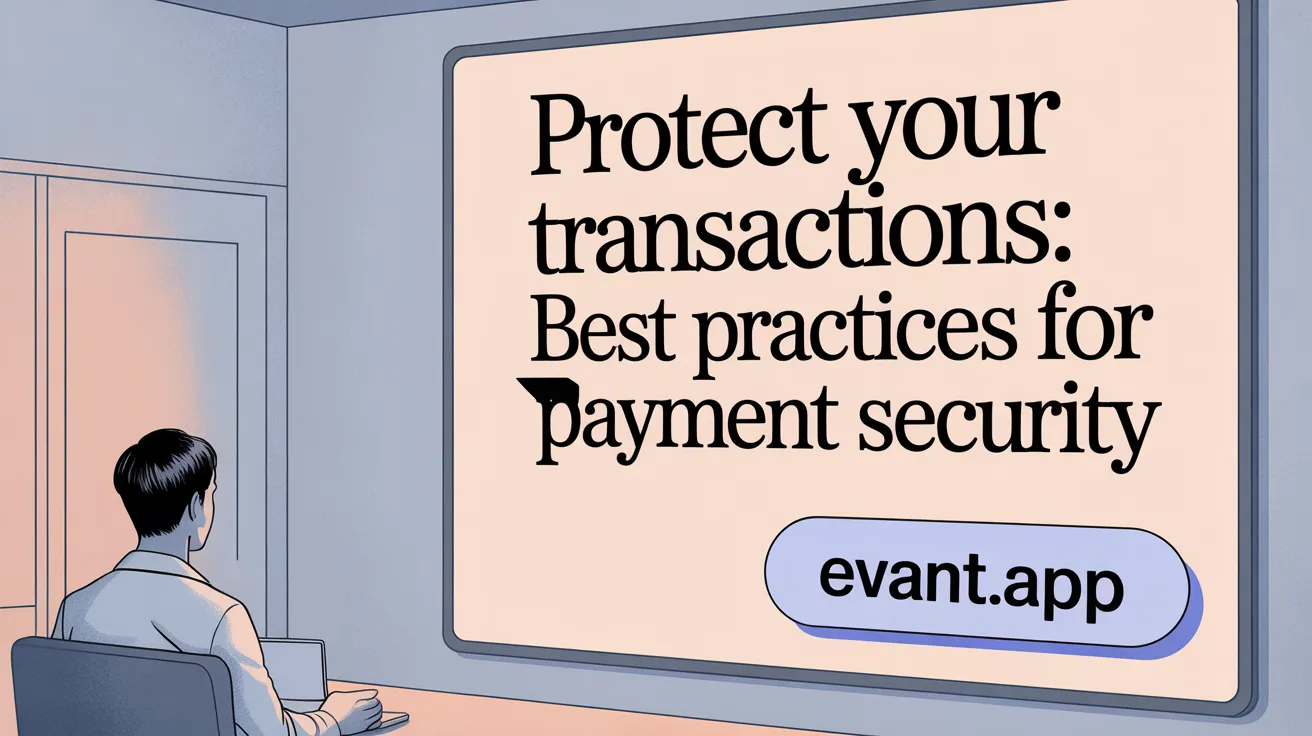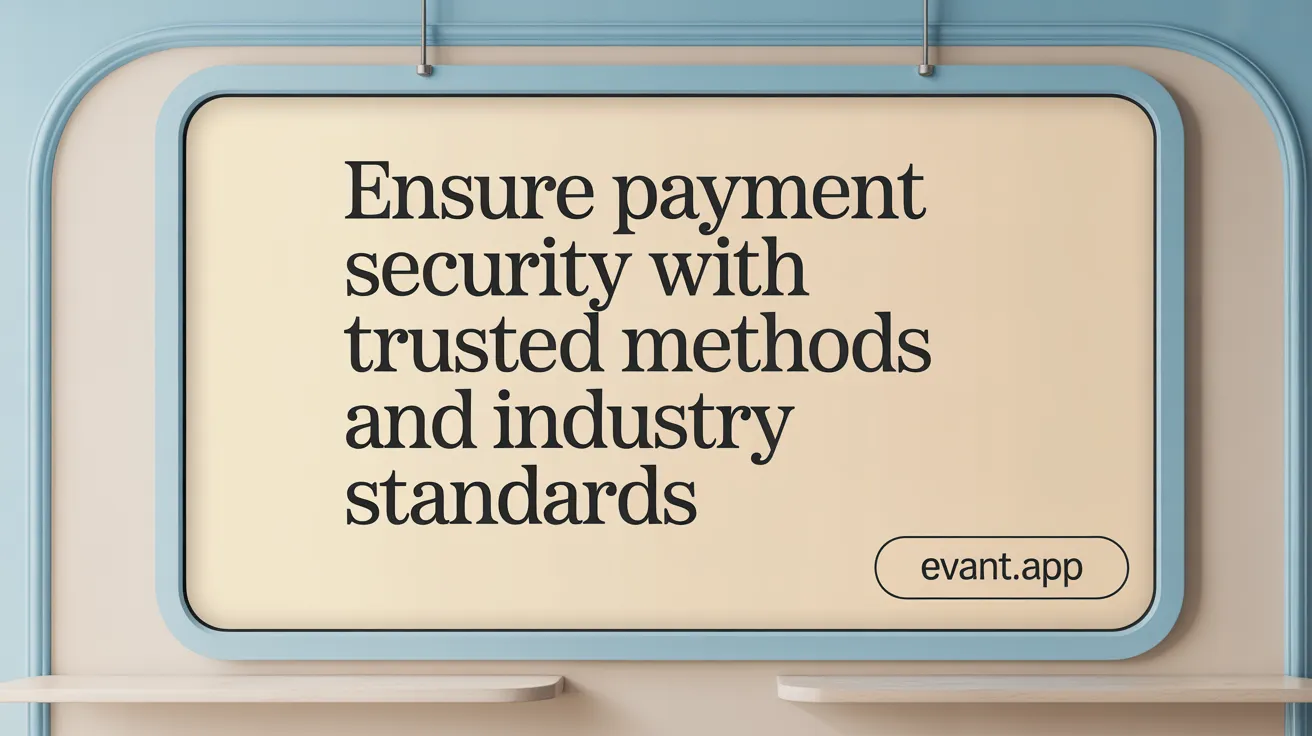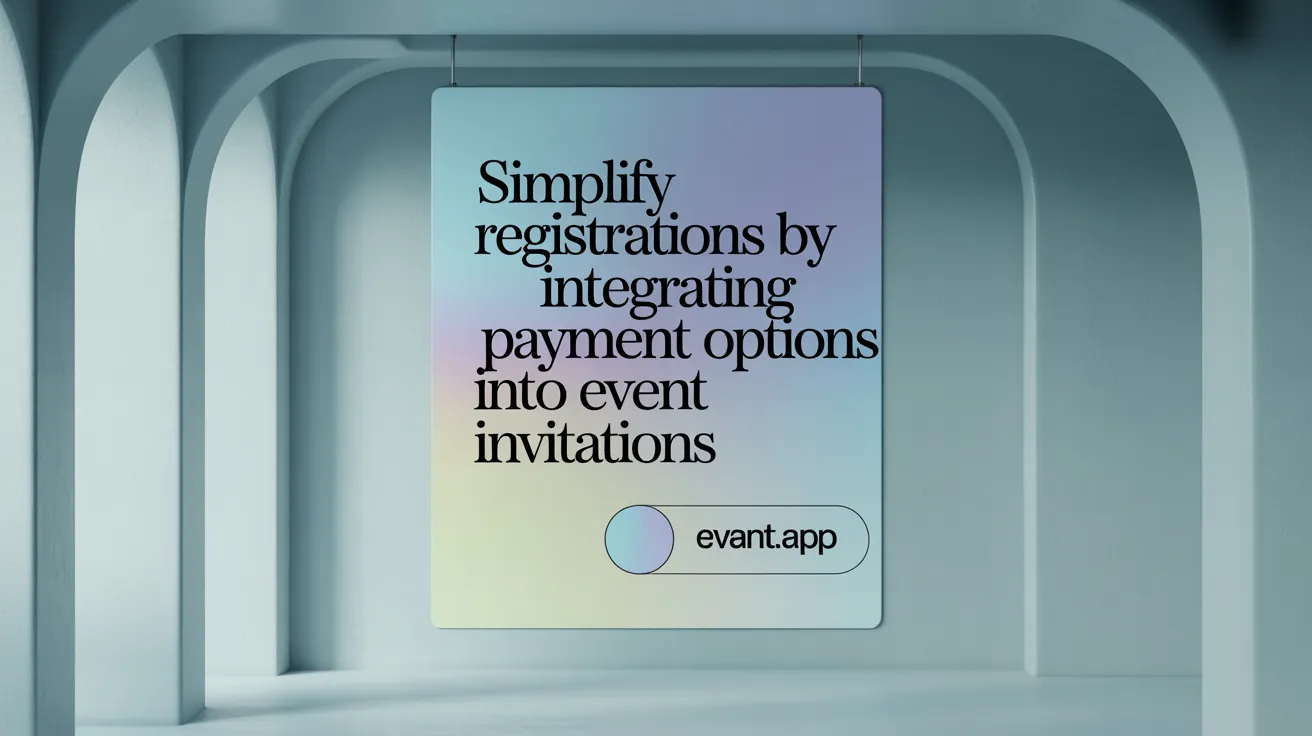Why Integrate Secure Payments with RSVP Workflows?
Integrating secure online payment collection into RSVP workflows is pivotal for event organizers aiming to enhance attendee convenience, improve registration rates, and ensure financial security. With the rise of digital event management, coupling RSVP processes with trusted payment gateways fosters trust and simplifies operations from invitation to payment reconciliation. This article explores how to seamlessly implement secure payment collection within RSVP workflows, the best practices to protect transactions, and the tools and strategies that support this integration.
Integrating Secure Online Payment Collection into RSVP Workflows
How can secure online payment collection be integrated into RSVP workflows?
Secure online payment collection can be seamlessly incorporated into RSVP processes by leveraging specialized platforms like RSVPify or Cognito Forms, which support built-in payment processing features. These platforms partner with trusted providers such as PayPal, Stripe, and Square, ensuring that every transaction complies with industry security standards such as PCI DSS, and data is encrypted during transmission.
Embedding payment options directly within RSVP forms allows attendees to pay at the time of registration, whether for tickets, donations, or additional event charges. This integration simplifies the process for users, reducing drop-off rates and increasing overall conversion. Custom payment fields can be added to accommodate various payment types, currencies, and billing options, providing a flexible and user-friendly experience.
Automation plays a vital role in maintaining transparency and record accuracy. Confirmations, receipts, and refunds are managed automatically, which enhances attendee trust and administrative efficiency. Payment data and transactions are logged securely, facilitating audits and financial reconciliation after the event.
Furthermore, integration with payment processors ensures that transferred funds are quick and reliable, with payout schedules customizable based on account settings. This overall setup not only streamlines event registration but also safeguards sensitive financial information, bolstering participant confidence. Learn more about effective event payment processing and secure payments online for enhanced security.
By choosing platforms with comprehensive security measures—like encryption, tokenization, and compliance protocols—you can deliver a smooth, secure, and efficient payment experience embedded into your RSVP workflows, reducing manual effort and elevating the attendee experience.
Best Practices for Ensuring Payment Security in Online Transactions

What are the best practices for ensuring payment security in online transactions?
Securing online payments is crucial for earning customer trust and preventing financial losses. Businesses should start by implementing strong encryption protocols such as SSL and TLS for payment security. These protocols encrypt data transmitted between customers and the server, making it unreadable to interceptors.
Compliance with PCI DSS security standards is essential, as they set the security benchmarks for handling credit card information. Incorporating tokenization benefits replaces sensitive data with non-sensitive tokens, reducing the risk if data is compromised.
Employing multi-factor authentication (MFA) adds an extra layer of security, requiring users to verify their identity through methods like codes sent to mobile devices or biometric scans.
Using secure payment gateways equipped with fraud detection tools helps identify suspicious transactions early. Regular employee training on cybersecurity best practices, including phishing awareness and secure data handling, further diminishes human-related vulnerabilities.
Continuous monitoring of transaction patterns and suspicious activity allows prompt response to emerging threats. Partnering with reputable payment providers that offer advanced security features ensures a robust defense.
Combining these measures creates a comprehensive security environment that protects customer data, maintains compliance, and enhances overall trustworthiness of your online payment processes.
Key Secure Payment Methods, Gateways, and Compliance Standards

In today's digital economy, ensuring the security of online payments is essential for protecting customer data and maintaining trust. Trusted payment gateways like Stripe play a crucial role in facilitating secure transaction processing by encrypting sensitive payment information. These gateways support advanced encryption protocols such as SSL (Secure Sockets Layer) and TLS (Transport Layer Security), which establish secure connections between web servers and users' browsers, preventing data interception during transmission.
Security standards such as PCI DSS (Payment Card Industry Data Security Standard) provide a comprehensive framework that organizations must adhere to for handling payment card data securely. PCI DSS encompasses requirements like regular system updates, network security measures—including the use of firewalls and intrusion detection systems—and ongoing vulnerability assessments. These measures help reduce the risk of data breaches and fraud.
An important technique enhancing payment security is tokenization, which replaces sensitive card details with non-sensitive, randomly generated tokens. This method minimizes the risk of compromised data because tokens are useless if intercepted. Authentication methods, particularly multi-factor authentication (MFA), verify user identities through multiple verification steps, such as SMS codes, biometric scans, or security tokens, adding an extra layer of security to payment processes.
Together, these methods and standards form a multi-layered defense that ensures payment safety. By integrating robust gateways like Stripe, implementing encryption protocols, complying with PCI DSS, and employing tokenization and MFA, businesses can significantly reduce their vulnerability to cyber threats while providing customers with safe, seamless payment experiences.
Incorporating Payment Functionalities into Event Invitations and Registration

How can payment functionalities be incorporated into event invitations and registration processes?
Payment functionalities can be seamlessly integrated into event invitations and registration workflows by embedding secure online payment gateways such as Stripe, PayPal, or Square directly into the registration platform. These gateways enable attendees to make payments securely during the registration process, supporting multiple payment options like credit cards, digital wallets, bank transfers, and even alternative methods such as QR code or account-to-account payments.
By embedding these payment options into the registration flow, organizers reduce the chances of registration drop-offs and can streamline attendee checkout experiences. Features like automated payment plans, recurring billing, and real-time payment status updates help manage cash flow efficiently and encourage more registrations.
Offering mobile-friendly payment forms ensures that attendees can pay conveniently from their smartphones and tablets, which is critical for a broad reach. Additionally, supporting multiple currencies helps cater to international attendees, expanding the event's global accessibility.
Security is a top priority; utilizing PCI DSS-compliant payment gateways, encryption protocols like SSL/TLS, and fraud prevention tools safeguards sensitive attendee data. Combining these measures with user-friendly payment options ensures attendees trust the process, leading to higher registration rates and better event management. See detailed payment security overview and secure payments online.
Integrating payment options directly into event invitations and registration pages creates a cohesive, professional experience that boosts attendee satisfaction and simplifies financial reconciliation for organizers. For best practices on integrating payment gateways in event management software and examples of payment gateway integration for events, please refer to these resources.
Comparing Payment Providers and Gateways Suitable for RSVP and Event Management

When choosing a payment provider for RSVP and event management, several options stand out due to their ability to deliver secure, flexible, and integrated payment solutions.
Stripe, PayPal, Eventbrite, and RSVPify are among the leading platforms that support event-related transactions. RSVPify seamlessly integrates with Stripe, allowing hosts to collect ticket sales and donations securely while automating communication with guests. Similarly, Eventcube leverages Stripe to provide over 100 payment options, enabling event organizers to accept diverse methods like credit cards, bank transfers, and digital wallets. It also offers features such as multiple ticket tiers, discount codes, and real-time sales analytics.
Eventbrite caters to a wide range of events, supporting online and onsite payments through popular methods like Apple Pay, Google Pay, and credit cards. Its integration capabilities help manage RSVPs efficiently alongside payment processing, though it applies service fees on transactions.
Different gateways vary in their fit for multiservice needs. Eventcube’s extensive customization and multiple payment support make it suitable for large or complex events, while platforms like Brown Paper Tickets appeal to smaller, eco-conscious organizers with straightforward pricing.
When evaluating providers, consider their features and scalability. Event organizers should look for support in handling multiple currencies, customization options, compliance standards, and the ability to grow alongside their events.
Below is a comparison table delineating the major features of these providers:
| Provider | Integration with RSVP/Event Systems | Payment Methods Supported | Customization & Scalability | Multi-currency Support |
|---|---|---|---|---|
| RSVPify + Stripe | Yes | Credit cards, digital wallets, donations | High | Yes |
| Eventcube | Yes | Over 100 options including bank transfer | High | Yes |
| Eventbrite | Yes | Major credit cards, Apple Pay, GPay | Moderate | Yes |
| Brown Paper Tickets | Limited | Credit cards, ACH, electronic checks | Basic | Limited |
Choosing the right provider depends on your event size, required features, and budget. Platforms like RSVPify tailored with Stripe offer strong security and flexibility, making them popular choices for diverse events. Meanwhile, solutions such as Eventbrite and Eventcube accommodate larger audiences with customizable, multi-method payment options supporting international attendees.
In conclusion, matching your event’s needs with an appropriate payment partner ensures a smooth registration process, boosts attendee confidence, and enhances revenue. Whether you prefer seamless integrations like RSVPify with Stripe or comprehensive platforms like Eventbrite, selecting a suitable payment gateway is critical for successful event management.
Technical Solutions and Tools for Seamless Payment Integration in Event Workflows
Integrating payments smoothly into event workflows requires robust technical solutions and a strategic approach.
Platforms like Zuddl and Oveit provide comprehensive, integrated event payment processing features tailored for event organizers. These platforms support a wide range of payment methods, including credit and debit cards, bank transfers, digital wallets, and even cryptocurrencies. They are designed with security in mind, complying with PCI DSS standards and employing real-time fraud detection to safeguard transactions.
Out-of-the-box integrations with popular event management systems, customer relationship management (CRM) tools, and marketing automation platforms further streamline the payment collection process. Such integrations enable organizers to manage attendee registration, track revenue, and enhance post-event engagement seamlessly.
Advanced features like multi-currency support facilitate international transactions, while automated billing and wearable cashless payment options improve guest convenience. Real-time dashboards give organizers visibility into payment statuses and help in quick troubleshooting.
To ensure a smooth transition to new payment systems, a staged approach is recommended. This includes conducting workflow audits to identify integration points, running trial implementations, and training team members on the new processes.
Combining secure, versatile, and seamlessly integrated payment tools within a comprehensive event technology ecosystem enhances transaction efficiency, improves attendee experience, and reduces operational friction. Such solutions are vital for modern event management, enabling secure, fast, and flexible financial transactions from planning to post-event analysis.
Automating RSVP and Payment Processes with Workflow Tools

How can RSVP and payment processes be automated using workflow tools and integrations?
Automation plays a vital role in simplifying event management by reducing manual workload and increasing accuracy.
RSVPify streamlines this process by enabling automated event registration, check-in, and payment handling through secure integrations with Stripe. Once connected, RSVPify processes payments in real-time, with payouts typically completed within 48 hours. The platform allows event organizers to automate sending invitations via email, generate QR codes for easier check-in, and manage complex event arrangements like seating and custom questions without extra effort.
Relay.app offers another powerful solution by using a no-code platform to automate RSVP workflows. It integrates smoothly with Google Workspace tools such as Gmail and Google Sheets. AI-driven response extraction automatically identifies responses and updates tracking sheets instantly. This automation means messages and reminders can be sent automatically based on responses, ensuring timely follow-ups and reducing manual intervention.
Both RSVPify and Relay.app facilitate creating personalized, automated workflows that ensure the right communications are sent at the right time, streamlining the entire process from invitation to confirmation to payment collection.
Benefits of integrating these tools: time savings, error reduction, and smoother attendee experience
Using these workflow tools, event organizers save significant time, often hours that would otherwise be spent on manual follow-up and data entry.
Automated response handling minimizes human errors, ensuring accurate attendee data and seamless payment collection.
Attendees benefit from prompt communication, easy check-in, and multiple payment options, leading to improved satisfaction and higher registration rates.
In sum, integrating RSVPify Stripe integration, Relay.app automation, and payment platforms like Stripe creates a robust, efficient, and user-friendly event management system that adapts to modern needs.
Strategies for Managing and Securing Online Payments During Event Registration
What strategies can be used to manage and secure online payments during event registration?
Handling online payments securely is crucial for event organizers aiming to protect attendee data and ensure smooth transactions. The first step is to choose reputable payment processors such as Stripe, PayPal, or BlueSnap. These platforms support multiple payment options, including credit/debit cards, digital wallets like Apple Pay and Google Pay, and QR code payments, accommodating diverse attendee preferences.
Ensuring compliance with PCI DSS standards is vital. This involves adhering to robust security protocols such as data encryption, employing firewalls, and conducting regular security scans. Using encryption technologies like SSL/TLS secures transactions by encoding sensitive information during transmission, preventing interception.
Integrating seamless payment gateways directly into registration workflows enhances user experience. It allows attendees to complete payments on-site without redirections, increasing the likelihood of registration completion. Offering various payment methods, especially mobile-friendly options, broadens accessibility, enabling more attendees to participate.
Post-event, managing reconciliation and compliance is essential. This includes verifying transaction data, settling funds securely, and maintaining transparent records. Proper reconciliation ensures all registrations are accounted for and funds are correctly allocated, reducing errors and fraud.
In summary, combining trusted payment services, stringent security measures, convenient payment options, and clear post-event financial management creates a secure and efficient online payment environment for successful event registration.
Components, Features, and Security Measures of Secure Payment Systems
Secure payment systems are designed to protect sensitive financial data during digital transactions through a combination of advanced components and strict security protocols. Encryption forms the backbone of these systems, with SSL/TLS protocols encrypting data during transmission to prevent interception by malicious actors. Tokenization further enhances security by replacing real payment data, such as credit card numbers, with randomly generated tokens that are useless if compromised.
Multi-factor authentication (MFA) and biometric security methods add additional layers of verification, ensuring that only authorized users can access payment information. By requiring a second form of identification—such as a fingerprint, facial recognition, or one-time passcodes—these measures significantly reduce fraud risks.
Fraud detection systems utilize AI-powered pattern analysis and machine learning to continuously monitor transactions in real time. These systems employ techniques like velocity checks, IP and proxy detection, and behavioral analytics to flag suspicious activity before processing is completed.
Compliance with industry standards like PCI DSS (Payment Card Industry Data Security Standard) is critical. PCI DSS mandates best practices including secure network architecture, regular vulnerability scans, and robust access controls to safeguard cardholder data. Many systems also implement end-to-end encryption (E2EE) ensuring data remains protected from the point of entry through to processing.
Digital wallets, such as PayPal, Apple Pay, and Google Pay, incorporate encryption and tokenization, enabling secure and contactless payments. Similarly, EMV chip cards generate unique transaction codes for each payment, significantly reducing card-present fraud.
Additional proprietary security measures include bank-specific protocols, intrusion detection systems, and layered defense strategies. These components collectively create a resilient infrastructure, minimizing vulnerabilities, preventing unauthorized access, and fostering customer trust.
By integrating multiple security layers—encryption, authentication, fraud detection, and compliance—secure payment systems deliver reliable and safe environments for digital transactions. They are instrumental in reducing fraud, ensuring data confidentiality, and maintaining adherence to evolving regulatory standards, thus facilitating smooth and secure financial exchanges in the digital economy.
Building Trust and Efficiency with Secure Payment-Enabled RSVPs
Integrating secure payment collection into your RSVP workflow not only streamlines event registration but also fosters attendee confidence and simplifies financial management. By adopting trusted payment gateways, adhering to security standards such as PCI DSS and SSL/TLS encryption, and utilizing automation tools to reduce manual effort, event organizers can enhance user experience and operational efficiency. Comparing payment providers and implementing best security practices ensures seamless, scalable, and compliant transactions tailored to various event types. As digital events continue to evolve, embracing comprehensive payment integration and security measures will remain fundamental to successful and trustworthy event management.
Related Blogs


How Community Churches Should Leverage SMS to Boost Engagement
Michael PedoeemStruggling with low church attendance? Discover how to leverage SMS to reach 98% of your congregation instantly and review the top 5 church communication platforms.


SMS for Churches: A Guide to Better Engagement
Michael PedoeemLearn how SMS for churches can boost engagement, improve communication, and streamline event management. Discover best practices for church texting today.
Ready to transform your community










